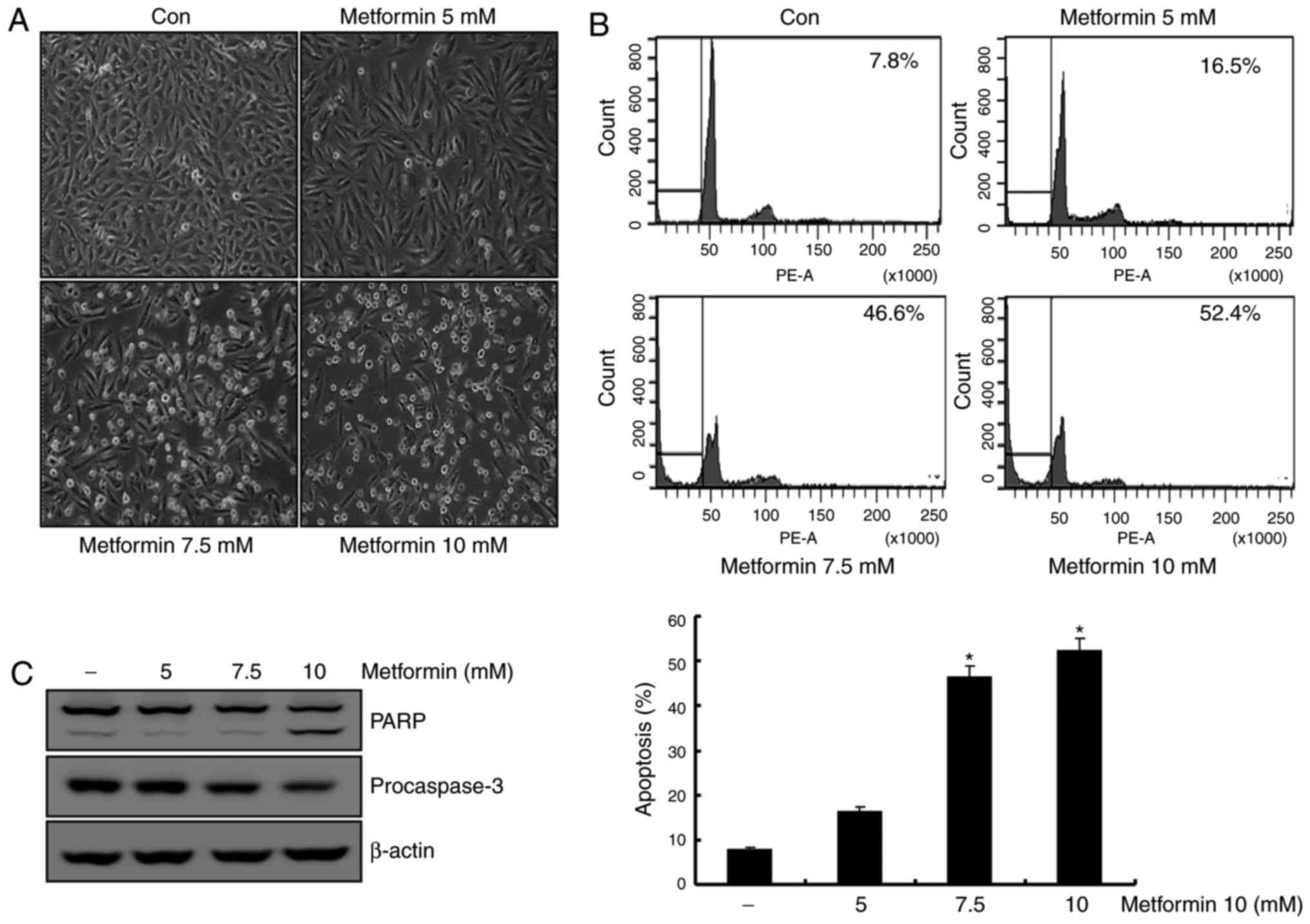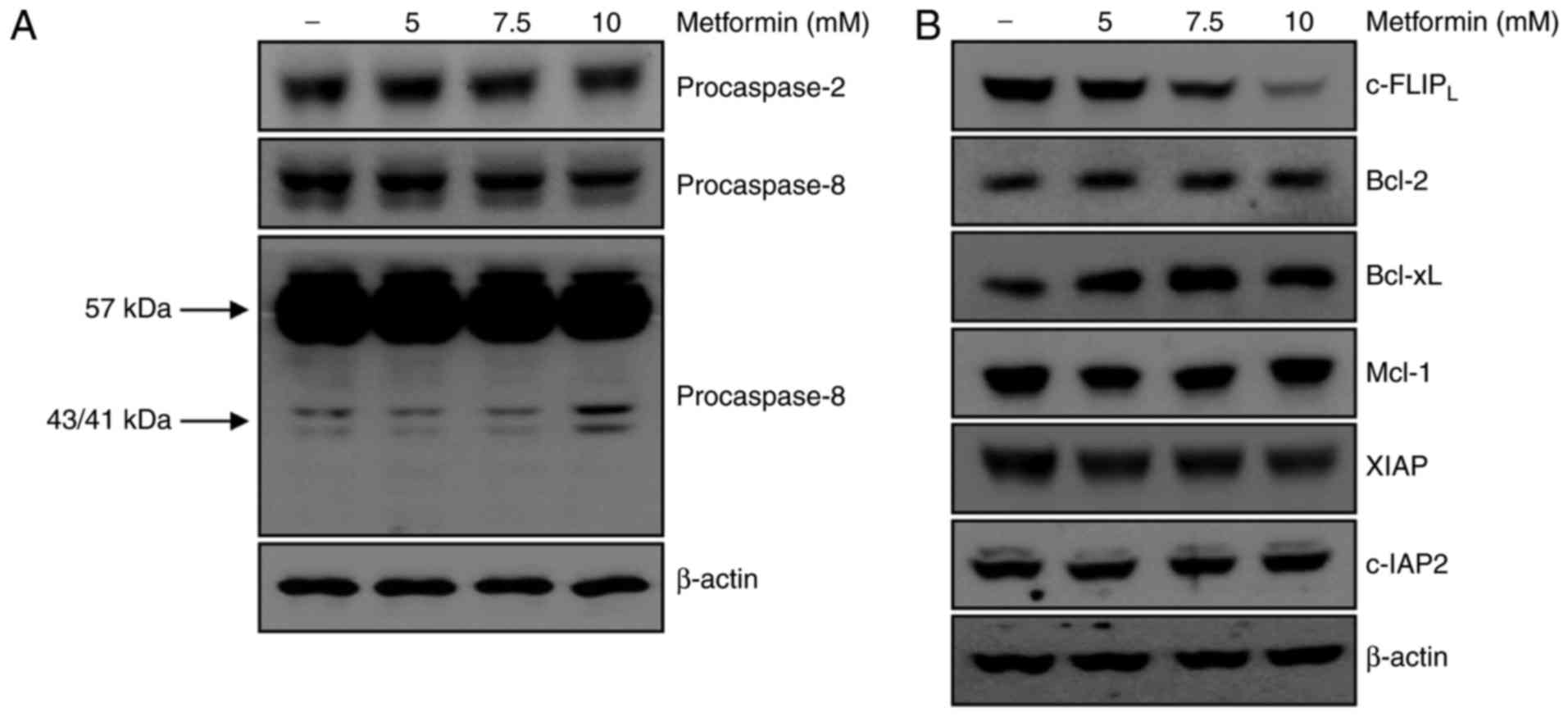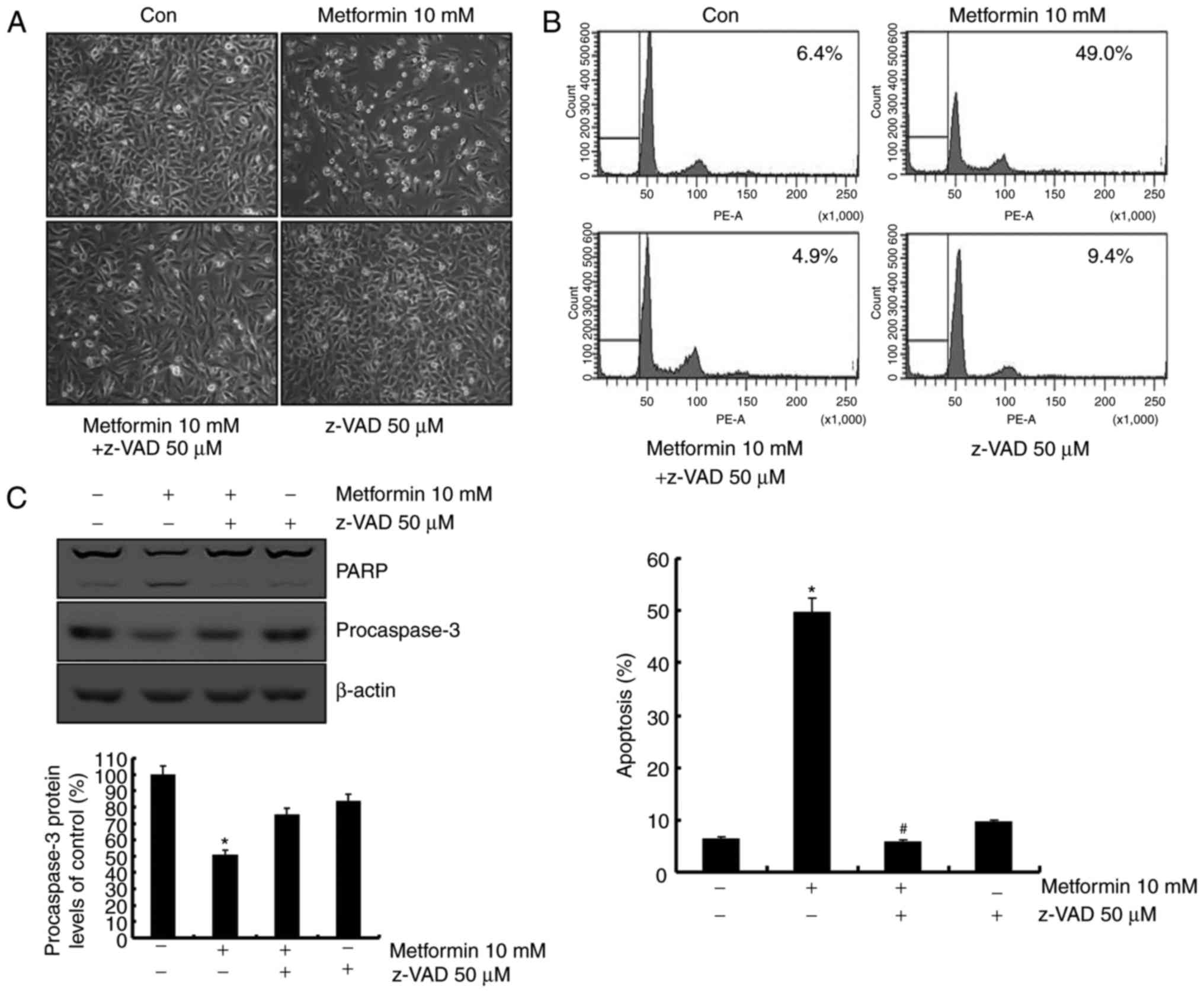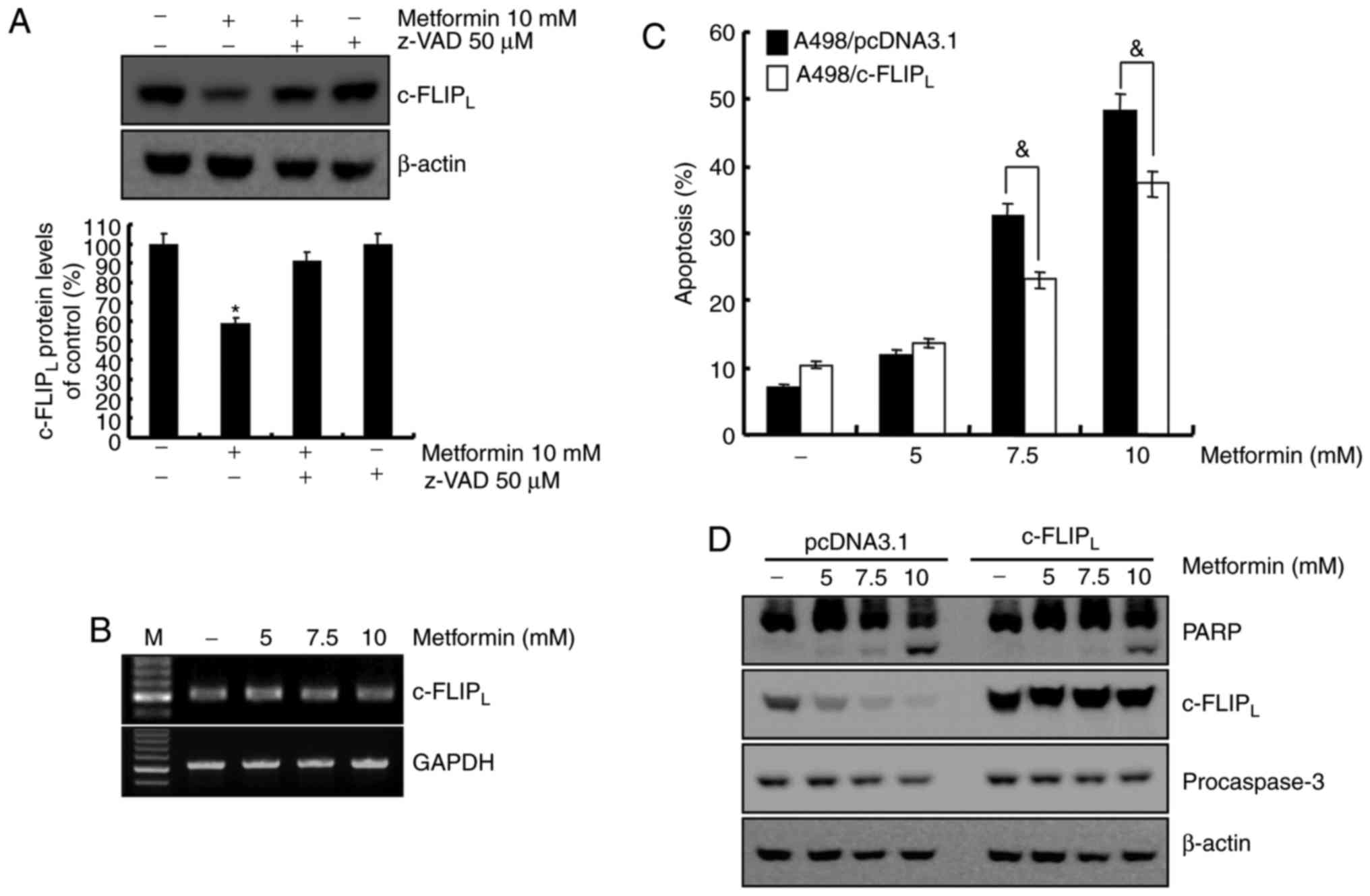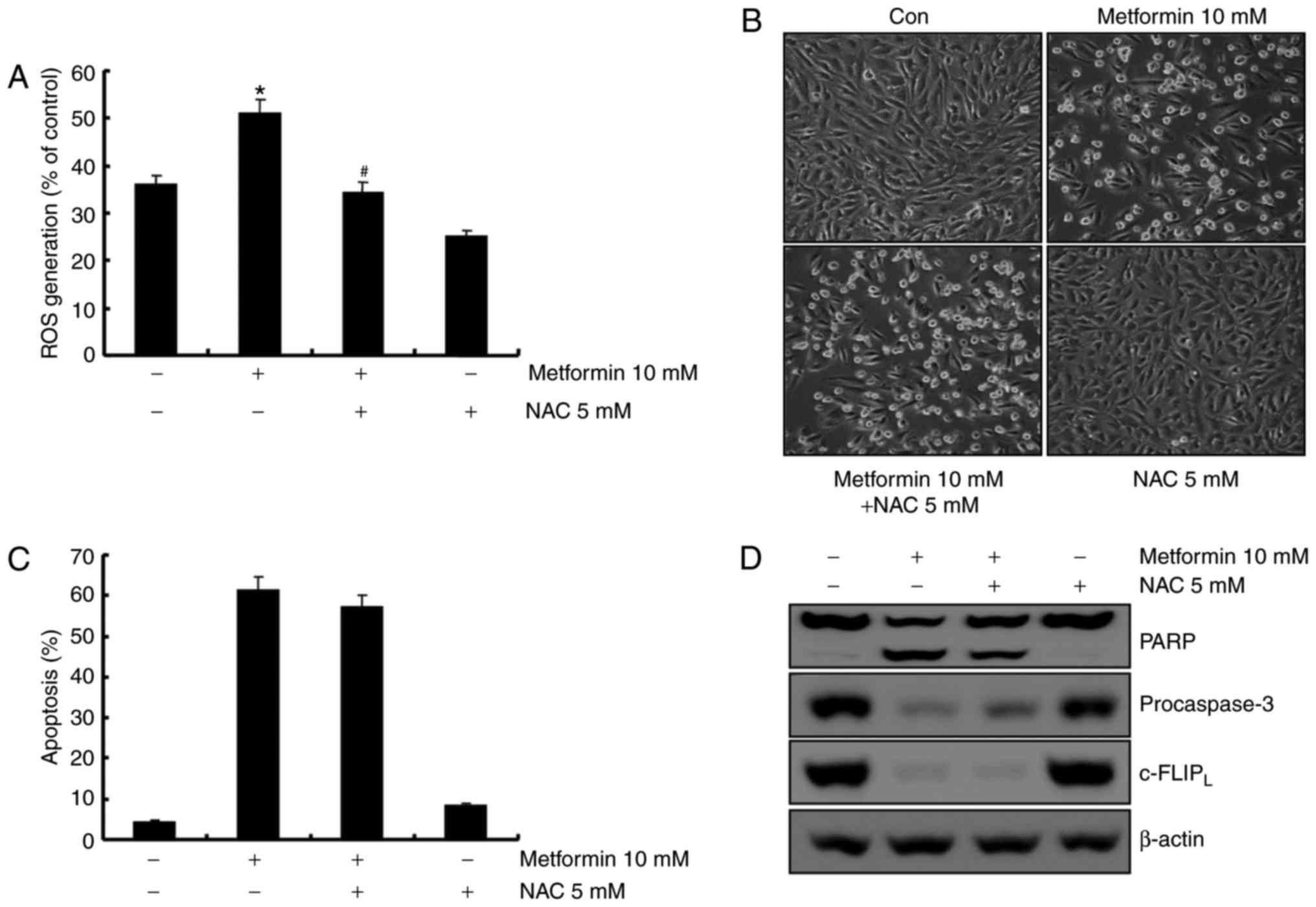|
1
|
Low G, Huang G, Fu W, Moloo Z and Girgis
S: Review of renal cell carcinoma and its common subtypes in
radiology. World J Radiol. 8:484–500. 2016. View Article : Google Scholar : PubMed/NCBI
|
|
2
|
Atzpodien J, Kirchner H and Poliwoda H:
Interleukin 2 based ambulatory therapy of metastatic renal cell
carcinoma. Med Klin (Munich). 91(Suppl. (3): S38–S43. 1996.(In
German).
|
|
3
|
Rabinovitch RA, Zelefsky MJ, Gaynor JJ and
Fuks Z: Patterns of failure following surgical resection of renal
cell carcinoma: Implications for adjuvant local and systemic
therapy. J Clin Oncol. 12:206–212. 1994. View Article : Google Scholar : PubMed/NCBI
|
|
4
|
Malek M, Aghili R, Emami Z and Khamseh ME:
Risk of cancer in diabetes: The effect of metformin. ISRN
Endocrinol. 2013:6369272013. View Article : Google Scholar : PubMed/NCBI
|
|
5
|
Algire C, Amrein L, Zakikhani M, Panasci L
and Pollak M: Metformin blocks the stimulative effect of a
high-energy diet on colon carcinoma growth in vivo and is
associated with reduced expression of fatty acid synthase. Endocr
Relat Cancer. 17:351–360. 2010. View Article : Google Scholar : PubMed/NCBI
|
|
6
|
Zhang ZJ, Zheng ZJ, Kan H, Song Y, Cui W,
Zhao G and Kip KE: Reduced risk of colorectal cancer with metformin
therapy in patients with type 2 diabetes: A meta-analysis. Diabetes
Care. 34:2323–2328. 2011. View Article : Google Scholar : PubMed/NCBI
|
|
7
|
Nair V, Pathi S, Jutooru I, Sreevalsan S,
Basha R, Abdelrahim M, Samudio I and Safe S: Metformin inhibits
pancreatic cancer cell and tumor growth and downregulates Sp
transcription factors. Carcinogenesis. 34:2870–2879. 2013.
View Article : Google Scholar : PubMed/NCBI
|
|
8
|
Gotlieb WH, Saumet J, Beauchamp MC, Gu J,
Lau S, Pollak MN and Bruchim I: In vitro metformin anti-neoplastic
activity in epithelial ovarian cancer. Gynecol Oncol. 110:246–250.
2008. View Article : Google Scholar : PubMed/NCBI
|
|
9
|
Emami Riedmaier A, Fisel P, Nies AT,
Schaeffeler E and Schwab M: Metformin and cancer: From the old
medicine cabinet to pharmacological pitfalls and prospects. Trends
Pharmacol Sci. 34:126–135. 2013. View Article : Google Scholar : PubMed/NCBI
|
|
10
|
Zhang ZJ, Zheng ZJ, Shi R, Su Q, Jiang Q
and Kip KE: Metformin for liver cancer prevention in patients with
type 2 diabetes: A systematic review and meta-analysis. J Clin
Endocrinol Metab. 97:2347–2353. 2012. View Article : Google Scholar : PubMed/NCBI
|
|
11
|
Rice S, Pellat L, Ahmetaga A, Bano G,
Mason HD and Whitehead SA: Dual effect of metformin on growth
inhibition and oestradiol production in breast cancer cells. Int J
Mol Med. 35:1088–1094. 2015. View Article : Google Scholar : PubMed/NCBI
|
|
12
|
Fang Z, Xu X, Zhou Z, Xu Z and Liu Z:
Effect of metformin on apoptosis, cell cycle arrest migration and
invasion of A498 cells. Mol Med Rep. 9:2251–2256. 2014. View Article : Google Scholar : PubMed/NCBI
|
|
13
|
Ucbek A, Ozunal ZG, Uzun O and Gepdiremen
A: Effect of metformin on the human T98G glioblastoma multiforme
cell line. Exp Ther Med. 7:1285–1290. 2014. View Article : Google Scholar : PubMed/NCBI
|
|
14
|
Jung TW, Lee MW, Lee YJ and Kim SM:
Metformin prevents endoplasmic reticulum stress-induced apoptosis
through AMPK-PI3K-c-Jun NH2 pathway. Biochem Biophys Res Commun.
417:147–152. 2012. View Article : Google Scholar : PubMed/NCBI
|
|
15
|
Fujimori T, Kato K, Fujihara S, Iwama H,
Yamashita T, Kobayashi K, Kamada H, Morishita A, Kobara H, Mori H,
et al: Antitumor effect of metformin on cholangiocarcinoma: In
vitro and in vivo studies. Oncol Rep. 34:2987–2996. 2015.
View Article : Google Scholar : PubMed/NCBI
|
|
16
|
He MX and He YW: A role for c-FLIP(L) in
the regulation of apoptosis, autophagy, and necroptosis in T
lymphocytes. Cell Death Differ. 20:188–197. 2013. View Article : Google Scholar : PubMed/NCBI
|
|
17
|
Bagnoli M, Ambrogi F, Pilotti S, Alberti
P, Ditto A, Barbareschi M, Galligioni E, Biganzoli E, Canevari S
and Mezzanzanica D: c-FLIPL expression defines two ovarian cancer
patient subsets and is a prognostic factor of adverse outcome.
Endocr Relat Cancer. 16:443–453. 2009. View Article : Google Scholar : PubMed/NCBI
|
|
18
|
Safa AR, Day TW and Wu CH: Cellular
FLICE-like inhibitory protein (C-FLIP): A novel target for cancer
therapy. Current Cancer Drug Targets. 8:37–46. 2008. View Article : Google Scholar : PubMed/NCBI
|
|
19
|
Bagnoli M, Canevari S and Mezzanzanica D:
Cellular FLICE-inhibitory protein (c-FLIP) signalling: A key
regulator of receptor-mediated apoptosis in physiologic context and
in cancer. Int J Biochem Cell Biol. 42:210–213. 2010. View Article : Google Scholar : PubMed/NCBI
|
|
20
|
Koenig A, Buskiewicz IA, Fortner KA,
Russell JQ, Asaoka T, He YW, Hakem R, Eriksson JE and Budd RC: The
c-FLIPL cleavage product p43FLIP promotes activation of
extracellular signal-regulated kinase (ERK), nuclear factor kappaB
(NF-κB), and caspase-8 and T cell survival. J Biol Chem.
289:1183–1191. 2014. View Article : Google Scholar : PubMed/NCBI
|
|
21
|
Nazim UM, Moon JH, Lee JH, Lee YJ, Seol
JW, Eo SK, Lee JH and Park SY: Activation of autophagy flux by
metformin downregulates cellular FLICE-like inhibitory protein and
enhances TRAIL-induced apoptosis. Oncotarget. 7:23468–23481. 2016.
View Article : Google Scholar : PubMed/NCBI
|
|
22
|
Zhang T, Wang X, He D, Jin X and Guo P:
Metformin sensitizes human bladder cancer cells to TRAIL-induced
apoptosis through mTOR/S6K1-mediated downregulation of c-FLIP.
Anticancer Drugs. 25:887–897. 2014. View Article : Google Scholar : PubMed/NCBI
|
|
23
|
Gao ZY, Liu Z, Bi MH, Zhang JJ, Han ZQ,
Han X, Wang HY, Sun GP and Liu H: Metformin induces apoptosis via a
mitochondria-mediated pathway in human breast cancer cells in
vitro. Exp Ther Med. 11:1700–1706. 2016. View Article : Google Scholar : PubMed/NCBI
|
|
24
|
Riedl SJ and Shi Y: Molecular mechanisms
of caspase regulation during apoptosis. Nat Rev Mol Cell Biol.
5:897–907. 2004. View
Article : Google Scholar : PubMed/NCBI
|
|
25
|
Ili CG, Brebi P, Tapia O, Sandoval A,
Lopez J, Garcia P, Leal P, Sidransky D, Guerrero-Preston R and Roa
JC: Cellular FLICE-like inhibitory protein long form (c-FLIPL)
overexpression is related to cervical cancer progression. Int J
Gynecol Pathol. 32:316–322. 2013. View Article : Google Scholar : PubMed/NCBI
|
|
26
|
Ding H, Han C, Guo D, Chin YW, Ding Y,
Kinghorn AD and D'Ambrosio SM: Selective induction of apoptosis of
human oral cancer cell lines by avocado extracts via a ROS-mediated
mechanism. Nutr Cancer. 61:348–356. 2009. View Article : Google Scholar : PubMed/NCBI
|
|
27
|
Maruthur NM, Tseng E, Hutfless S, Wilson
LM, Suarez-Cuervo C, Berger Z, Chu Y, Iyoha E, Segal JB and Bolen
S: Diabetes medications as monotherapy or metformin-based
combination therapy for type 2 diabetes: A systematic review and
Meta-analysis. Ann Intern Med. 164:740–751. 2016. View Article : Google Scholar : PubMed/NCBI
|
|
28
|
Xu HY, Fang W, Huang ZW, Lu JC, Wang YQ,
Tang QL, Song GH, Kang Y, Zhu XJ, Zou CY, et al: Metformin reduces
SATB2-mediated osteosarcoma stem cell-like phenotype and tumor
growth via inhibition of N-cadherin/NF-κB signaling. Eur Rev Med
Pharmacol Sci. 21:4516–4528. 2017.PubMed/NCBI
|
|
29
|
Figueroa-González G, Garcia-Castillo V,
Coronel-Hernández J, López-Urrutia E, León-Cabrera S, Arias-Romero
LE, Terrazas LI, Rodríguez-Sosa M, Campos-Parra AD, Zúñiga-Calzada
E, et al: Anti-inflammatory and antitumor activity of a triple
therapy for a colitis-related colorectal cancer. J Cancer.
7:1632–1644. 2016. View Article : Google Scholar : PubMed/NCBI
|
|
30
|
Yang Y, Jin G, Liu H, Liu K, Zhao J, Chen
X, Wang D, Bai R, Li X, Jang Y, et al: Metformin inhibits
esophageal squamous cell carcinoma-induced angiogenesis by
suppressing JAK/STAT3 signaling pathway. Oncotarget. 8:74673–74687.
2017.PubMed/NCBI
|
|
31
|
Tran LNK, Kichenadasse G, Butler LM,
Centenera MM, Morel KL, Ormsby RJ, Michael MZ, Lower KM and Sykes
PJ: The combination of metformin and valproic acid induces
synergistic apoptosis in the presence of p53 and androgen signaling
in prostate cancer. Mol Cancer Ther. 16:2689–2700. 2017. View Article : Google Scholar : PubMed/NCBI
|
|
32
|
Tsai HH, Lai HY, Chen YC, Li CF, Huang HS,
Liu HS, Tsai YS and Wang JM: Metformin promotes apoptosis in
hepatocellular carcinoma through the CEBPD-induced autophagy
pathway. Oncotarget. 8:13832–13845. 2017. View Article : Google Scholar : PubMed/NCBI
|
|
33
|
Bi T, Zhu A, Yang X, Qiao H, Tang J, Liu Y
and Lv R: Metformin synergistically enhances antitumor activity of
cisplatin in gallbladder cancer via the PI3K/AKT/ERK pathway.
Cytotechnology. 70:439–448. 2018. View Article : Google Scholar : PubMed/NCBI
|
|
34
|
Al-Zaidan L, El Ruz RA and Malki AM:
Screening novel molecular targets of metformin in breast cancer by
proteomic approach. Front Public Health. 5:2772017. View Article : Google Scholar : PubMed/NCBI
|
|
35
|
Belfiore A and Malaguarnera R: Insulin
receptor and cancer. Endocr Relat Cancer. 18:R125–R147. 2011.
View Article : Google Scholar : PubMed/NCBI
|
|
36
|
Rizos CV and Elisaf MS: Metformin and
cancer. Eur J Pharmacol. 705:96–108. 2013. View Article : Google Scholar : PubMed/NCBI
|
|
37
|
Galluzzi L, Lopez-Soto A, Kumar S and
Kroemer G: Caspases connect cell-death signaling to organismal
homeostasis. Immunity. 44:221–231. 2016. View Article : Google Scholar : PubMed/NCBI
|
|
38
|
Walters J, Pop C, Scott FL, Drag M, Swartz
P, Mattos C, Salvesen GS and Clark AC: A constitutively active and
uninhibitable caspase-3 zymogen efficiently induces apoptosis.
Biochem J. 424:335–345. 2009. View Article : Google Scholar : PubMed/NCBI
|
|
39
|
Spagnuolo C, Cerella C, Russo M,
Chateauvieux S, Diederich M and Russo GL: Quercetin downregulates
Mcl-1 by acting on mRNA stability and protein degradation. Br J
Cancer. 105:221–230. 2011. View Article : Google Scholar : PubMed/NCBI
|
|
40
|
Kruidering M and Evan GI: Caspase-8 in
apoptosis: The beginning of ‘the end’? IUBMB Life. 50:85–90. 2000.
View Article : Google Scholar : PubMed/NCBI
|
|
41
|
Patel S, Singh N and Kumar L: Evaluation
of effects of metformin in primary ovarian cancer cells. Asian Pac
J Cancer Prev. 16:6973–6979. 2015. View Article : Google Scholar : PubMed/NCBI
|
|
42
|
Li X, Li B, Ni Z, Zhou P, Wang B, He J,
Xiong H, Yang F, Wu Y, Lyu X, et al: Metformin synergizes with
BCL-XL/BCL-2 inhibitor ABT-263 to induce apoptosis specifically in
p53-defective cancer cells. Mol Cancer Ther. 16:1806–1818. 2017.
View Article : Google Scholar : PubMed/NCBI
|
|
43
|
Park SH, Lee DH, Kim JL, Kim BR, Na YJ, Jo
MJ, Jeong YA, Lee SY, Lee SI, Lee YY and Oh SC: Metformin enhances
TRAIL-induced apoptosis by Mcl-1 degradation via Mule in colorectal
cancer cells. Oncotarget. 7:59503–59518. 2016. View Article : Google Scholar : PubMed/NCBI
|
|
44
|
Strekalova E, Malin D, Rajanala H and
Cryns VL: Metformin sensitizes triple-negative breast cancer to
proapoptotic TRAIL receptor agonists by suppressing XIAP
expression. Breast Cancer Res Treat. 163:435–447. 2017. View Article : Google Scholar : PubMed/NCBI
|
|
45
|
Jang JH, Iqbal T, Min KJ, Kim S, Park JW,
Son EI, Lee TJ and Kwon TK: Helenalin-induced apoptosis is
dependent on production of reactive oxygen species and independent
of induction of endoplasmic reticulum stress in renal cell
carcinoma. Toxicol In Vitro. 27:588–596. 2013. View Article : Google Scholar : PubMed/NCBI
|
|
46
|
Woo SM, Min KJ and Kwon TK: Calyculin A
causes sensitization to tumor necrosis factor-related
apoptosis-inducing ligand (TRAIL)-induced apoptosis by ROS-mediated
down-regulation of cellular FLICE-inhibiting protein (c-FLIP) and
by enhancing death receptor 4 mRNA stabilization. Apoptosis.
17:1223–1234. 2012. View Article : Google Scholar : PubMed/NCBI
|
|
47
|
Wang Y, Yu X, Song H, Feng D, Jiang Y, Wu
S and Geng J: The STAT-ROS cycle extends IFN-induced cancer cell
apoptosis. Int J Oncol. 52:305–313. 2018.PubMed/NCBI
|
|
48
|
Sheikh BY, Sarker MMR, Kamarudin MNA and
Mohan G: Antiproliferative and apoptosis inducing effects of citral
via p53 and ROS-induced mitochondrial-mediated apoptosis in human
colorectal HCT116 and HT29 cell lines. Biomed Pharmacother.
96:834–846. 2017. View Article : Google Scholar : PubMed/NCBI
|
|
49
|
Rogalska A, Bukowska B and Marczak A:
Metformin and epothilone A treatment up regulate pro-apoptotic
PARP-1, Casp-3 and H2AX genes and decrease of AKT kinase level to
control cell death of human hepatocellular carcinoma and ovary
adenocarcinoma cells. Toxicol In Vitro. 47:48–62. 2018. View Article : Google Scholar : PubMed/NCBI
|
|
50
|
Haugrud AB, Zhuang Y, Coppock JD and
Miskimins WK: Dichloroacetate enhances apoptotic cell death via
oxidative damage and attenuates lactate production in
metformin-treated breast cancer cells. Breast Cancer Res Treat.
147:539–550. 2014. View Article : Google Scholar : PubMed/NCBI
|















